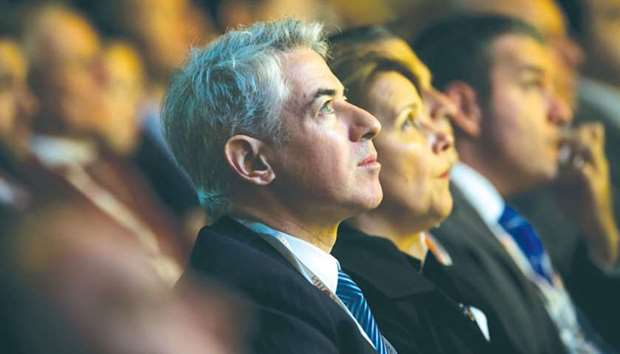Billionaire investor William Ackman said his hedge fund had taken an 8% stake in Automatic Data Processing and plans to ask for board seats so he can push the US human resources outsourcing company to cut costs and improve its returns.
Ackman’s move on ADP, which has a market value of about $50bn, comes as the leader of Pershing Square Capital Management looks for a big win following money-losing investments in debt-laden drug maker Valeant Pharmaceuticals International Inc and norovirus-stricken restaurant chain Chipotle Mexican Grill.
The 51-year-old activist investor said he would seek minority representation on ADP’s 10-member board.
ADP said earlier on Friday that Ackman wanted five board directors, including a seat for himself.
ADP also said Ackman wanted to oust Carlos Rodriguez, ADP’s chief executive since 2011.
Pershing Square said in a statement later in the day that it was willing to work with existing management at ADP or a new external CEO.
Ackman said he had asked ADP to extend its August 10 deadline for board nominations to facilitate negotiations with the company.
ADP said it declined this request, which would have pushed back the nomination deadline by as much as 45 days.
Ackman did not disclose his board nominees in his conversations with ADP, people familiar with the discussions told Reuters on condition of anonymity.
He could disclose them as early as next week, in a filing with the US Securities and Exchange Commission, which will have details on his position in ADP, one of the people added.
Ackman believes ADP can improve its operating performance by accelerating growth, improving the quality of its software and service offerings, slashing operating costs and increasing efficiency, Pershing Square said in its statement.
The stakes are high for Ackman.
His fund lost 10.2% last year after losing 16.6% in 2015.
It had posted a 37.2% gain in 2014. If Ackman misses the nomination deadline, ADP’s bylaws dictate that he would have to muster the support of 33% of the company’s shareholders to call for a special shareholder meeting, if he does not want to wait for next year’s annual meeting.
While Ackman is betting ADP’s stock, which he previously owned between 2009 and 2011, has room to rise, others are betting it will fall.
ADP is the third-most shorted company in the data processing and outsourced services sector behind Visa and PayPal Holdings, according to data analytics firm S3 Partners, amid concerns that new business bookings are slowing down.
ADP said that during Rodriguez’ six-year tenure, ADP has yielded a total shareholder return, which includes dividends, of 202%. That is well ahead of the Standard & Poor’s 500 Index, which has returned 128% on that basis over the same period, and Pershing Square itself, which has achieved only 29%.
Ackman may find it hard to challenge Rodriguez, given his track record as CEO, some analysts said.
“Rodriguez has very broad-based investor support and has factually delivered very compelling returns for shareholders so Pershing Square faces an uphill battle in this case,” said Bernstein Research analyst Lisa Ellis.
Ackman built his 8% stake in the company largely through derivatives, rather than common stock, according to ADP.
Accumulating a position in such a way allows activist investors to build large stakes more cheaply, because the stock does not run up once other company shareholders find out about their bet.
However, reports of Ackman accumulating a stake in the company surfaced last week, and ADP’s stock has risen 8% since then.
Pushing for new CEO has been a hallmark among activists recently.
This week, hedge fund Barington Capital notched a victory as Avon Products Inc CEO Sheri McCoy announced she would step down.
Carl Icahn won an even bigger prize by calling for the ouster of American International Group Inc CEO Peter Hancock, who left the company earlier this year.
Ackman himself has forced out CEOs at companies including Air Products & Chemicals Inc and Canadian Pacific Railway, where he earned large gains on his investments.

William Ackman, founder and CEO of Pershing Square Capital Management (centre), listens during a conference in New York. The 51-year-old activist investor said he would seek minority representation on Automatic Data Processing’s 10-member board. ADP said earlier that Ackman wanted five board directors, including a seat for himself.
